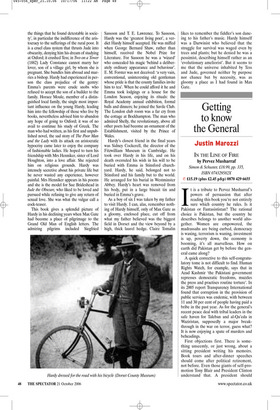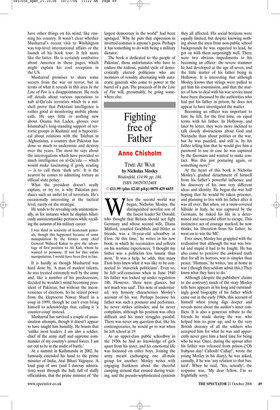Getting to know the General
Justin Marozzi
IN THE LINE OF FIRE by Pervez Musharraf Simon & Schuster, £18.99, pp. 335, ISBN 074329582X ✆ £15.19 (plus £2.45 p&p) 0870 429 6655 It is a tribute to Pervez Musharraf’s powers of persuasion that after reading this book you’re not entirely sure which country he rules. Is it Pakistan or Fantasististan? The rational choice is Pakistan, but the country he describes belongs to another world altogether. Women are empowered, the madrassahs are being curbed, democracy is waxing, terrorism is waning, investment is up, poverty down, the economy is booming, it’s all marvellous. How on earth did Pakistan get by before the general came along?
A quick corrective to this self-congratulatory tome is not difficult to find. Human Rights Watch, for example, says that in Azad Kashmir ‘the Pakistani government represses democratic freedoms, muzzles the press and practises routine torture’. In its 2005 report Transparency International found that corruption in the provision of public services was endemic, with between 11 and 30 per cent of people having paid a bribe in the past year. As for the general’s recent peace deal with tribal leaders in the safe haven for Taleban and al-Qa’eda in Waziristan, supposedly a major breakthrough in the war on terror, guess what? It is now enjoying a spate of murders and beheadings.
First objections first. There is something unseemly, or just wrong, about a sitting president writing his memoirs. Book tours and after-dinner speeches should come after political retirement, not before. Even those giants of self-promotion Tony Blair and President Clinton understand that. A president should have other things on his mind, like running his country. It wasn’t clear whether Musharraf’s recent visit to Washington was top-level international affairs or the launch of his book tour. It felt more like the latter. He is certainly combative about America in these pages, which might explain his cool reception in the US.
Musharraf promises to share some secrets from the war on terror, but in terms of what it reveals in this area In the Line of Fire is a disappointment. He reels off details about various operations to nab al-Qa’eda terrorists which in a nutshell prove that Pakistani intelligence is rather good at monitoring mobile phone calls. He says little or nothing new about Osama bin Laden, glosses over Islamabad’s long-standing support of terrorist groups in Kashmir and is hypocritical about relations with the Taleban in Afghanistan, a country that Pakistan has done so much to undermine and destroy over the years. The most he says about the interrogations which have provided so much intelligence on al-Qa’eda — which would make fascinating if grisly reading — is to call them ‘dark arts’. It is the nearest he comes to admitting torture as official state policy.
What the president doesn’t really explain, or try to, is why Pakistan produces such an awful lot of terrorists. He’s occasionally interesting at the tactical level, rarely on the strategic.
He tends to be revealing only unintentionally, as for instance when he displays hilariously unstatesmanlike pettiness while recalling the autumn of his military career:
I was third in seniority of lieutenant generals, though this happened because of some manipulation by the former army chief General Waheed Kakar to give the advantage of first position to Ali Kuli, whom he wanted to promote. If not for this unfair manipulation, I would have been first in line.
It is hardly as though Musharraf was hard done by. A man of modest talents, he was treated extremely well by the army and, like a number of his predecessors, decided he wouldn’t mind becoming president of Pakistan, but without the inconvenience of elections. So he seized power from the kleptocrat Nawaz Sharif in a coup in 1999, though he can’t even bring himself to acknowledge that, calling it ‘a counter-coup’ instead.
Musharraf has survived a couple of assassination attempts, though it doesn’t appear to have taught him humility. He boasts that ‘unlike most leaders, I am also a soldier, chief of the army staff and supreme commander of my country’s armed forces. I am cut out to be in the midst of battle.’ At a summit in Kathmandu in 2002, he famously extended his hand to the prime minister of India, Atal Bihari Vajpayee. ‘A loud gasp of awe (and I daresay admiration) went through the hall, full of stuffy officialdom, that the prime minister of “the largest democracy in the world” had been upstaged.’ Why he puts that expression in inverted commas is anyone’s guess. Perhaps it has something to do with being a military dictator.
The book is dedicated to ‘the people of Pakistan’, those unfortunates who have to endure the tedious, painful cycle of democratically elected politicians who are monsters of venality alternating with autocratic generals who come to power at the barrel of a gun. The proceeds of In the Line of Fire will, presumably, be going somewhere else.



































































































 Previous page
Previous page